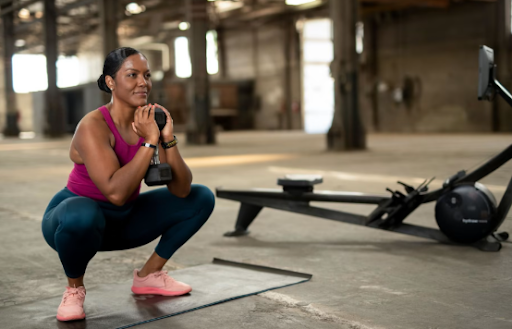Resistance Training During Menopause : Your Key to Strength, Balance, and Well-Being
Menopause is a natural stage in a woman’s life that brings many physical and emotional changes. Resistance training during menopause is a great way to stay strong, healthy, and confident. If you’re noticing weight gain, mood swings, or loss of muscle tone, this guide will walk you through why strength training matters now more than ever.
Let's look at how resistance workouts can boost your health, increase your energy, and help you stay true to yourself during menopause.
Why Resistance Training is Vital During Menopause
When estrogen levels drop during menopause, women often experience:
Muscle loss
Bone thinning
Increased body fat (especially belly fat)
Slower metabolism
Higher risk of heart disease and osteoporosis
Mood swings and anxiety
Resistance training directly addresses these challenges. It helps you build lean muscle. It also improves bone strength. You burn calories efficiently and balance your hormones naturally.
Understanding Resistance Training
What Is Resistance Training?
Resistance training is any exercise where your muscles work against force. This can include:
Lifting dumbbells or barbells
Using resistance bands
Bodyweight movements (like squats and push-ups)
Weight machines at the gym
Why It’s Different From Cardio
Cardio is great for heart health, but it doesn’t build muscle like resistance training does. During menopause, muscle mass naturally drops. So, it's important to lift weights to keep strength and function.
Health Benefits of Strength Training for Menopausal Women
1. Stronger Bones
As estrogen drops, bone density decreases, increasing the risk of fractures. Strength training puts stress on bones, which helps them grow stronger over time.
2. Faster Metabolism
Muscle burns more calories than fat, even at rest. The more muscle you have, the easier it becomes to manage weight.
3. Balanced Hormones
Exercise helps balance mood hormones. It also lessens hot flashes, anxiety, and sleep problems.
4. Improved Heart Health
Heart disease risk goes up after menopause. Resistance training helps by lowering blood pressure and cholesterol.
5. Better Mental Health
Exercise releases endorphins. These chemicals lift your mood and fight depression, anxiety, and stress.
Recommended Workout Routine for Menopausal Women
Weekly Plan:
3x per week: Full-body strength training (focus on form, 8–10 reps, moderate to heavy weights)
2x per week: HIIT (High-Intensity Interval Training)
Daily: Light walking or stretching for recovery
Key Exercises:
Lower Body: Squats, lunges, deadlifts
Upper Body: Rows, push-ups, chest press
Core: Planks, bird-dogs, leg raises
Tips:
Use proper form to avoid injury
Rest for 30–60 seconds between sets
Track your progress weekly
HIIT: A Smart Cardio Alternative
Instead of long cardio sessions, short HIIT workouts are more effective during menopause. These involve bursts of high effort (30 seconds) followed by short rests (30–60 seconds).
Benefits of HIIT:
Burns fat faster
Saves time
Boosts energy and heart health
Examples:
Sprinting on a bike
Fast uphill walking
Jump squats with rest intervals
Diet and Resistance Training: A Perfect Pair
Importance of Protein
Protein is crucial for muscle repair and bone strength. Aim for at least 1.2–1.5 grams of protein per kilogram of body weight daily.
Best Foods:
Eggs
Chicken or turkey
Greek yogurt
Lentils and beans
Protein smoothies
Hydration Matters
Drink enough water before and after workouts to stay energized and prevent cramps.
Managing Weight Gain Through Strength Training
Menopause often brings weight gain, especially around the belly. Resistance training helps by:
Reducing body fat
Building lean muscle
Boosting metabolism
Improving insulin sensitivity
Smart Strategies:
Lift weights regularly
Focus on compound movements (multiple muscles at once)
Combine with protein-rich meals
Emotional Balance and Confidence Through Movement
It’s normal to feel overwhelmed during menopause. Resistance training gives you a sense of control and power.
How It Helps:
Releases feel-good hormones
Increases self-confidence
Reduces anxiety and mood swings
You’re not just working out for your body — you’re strengthening your mindset.
Why Andrea Klas Fitness is Your Best Resource
At Andrea Klas Fitness, we go beyond basic advice. We offer:
Personalized workout plans tailored for menopausal women
Professional guidance with proven results
Easy-to-follow programs you can do at home or in the gym
A supportive community that understands your journey
Our programs are crafted with science-backed techniques and a personal touch to help you succeed long-term.
What Sets Us Apart:
We specialize in women’s fitness over 40
Realistic, time-efficient plans
Focus on both mental and physical health
Empathetic coaching that motivates without pressure
We offer real-life solutions for women going through menopause. Unlike generic workout sites, we focus on strength and grace.
Take Action: Start Your Strength Journey Today
Menopause doesn’t have to mean weakness or decline. In fact, it can be a time of empowerment and renewed strength.
Final Tips:
Start with small, consistent workouts
Don’t be afraid to lift heavier weights
Combine strength and HIIT for best results
Focus on rest, recovery, and self-compassion
Remember, you’re not alone — and it’s never too late to start. Prioritize your well-being today. Your strongest, healthiest self is waiting.
Looking for more guidance? Explore personalized plans and real transformation stories at AndreaKlasFitness.com.
Read More Article
The Science and Practice of Intermittent Fasting: Your Guide to Wellness
Why Resistance Training is Essential During Menopause
6 ways to stay fuller for longer
HIGH INTENSITY INTERVAL TRAINING (HIIT)

